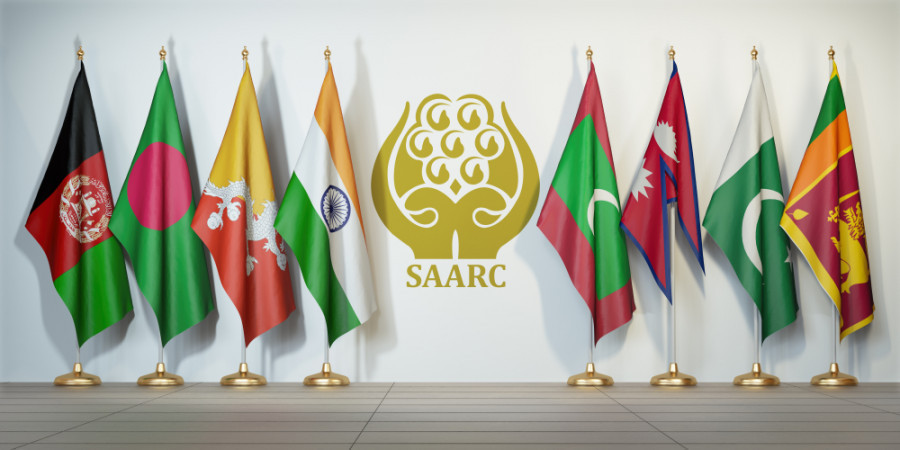Politics
Saarc in a fix over new secretary general
Replacement uncertain after Esala Ruwan Weerakoon of Sri Lanka retires in March.
Anil Giri
For the first time since its inception some 38 years ago, the South Asian Association for Regional Cooperation (SAARC) is facing an unprecedented crisis over who will be the next secretary general of the regional grouping, which currently is in a moribund state.
With the incumbent Saarc Secretary General Esala Ruwan Weerakoon of Sri Lanka all set to complete his tenure in March 2023, there is confusion as to who would replace Weerakoon. It is the turn of Afghanistan to recommend a new Saarc secretary general, but the current regime in Kabul is not recognised by any of the member states of the regional organisation following that country’s takeover by the Taliban in August last year.
Before Weerakoon retires, member states have to reach an understanding on his replacement.
As the current chair of the Saarc, Nepal has started taking a lead to remove this hurdle, according to the Ministry of Foreign Affairs. Weerakoon also met with Foreign Secretary Bharat Raj Paudyal this week to discuss how to remove the confusion, as the Saarc Charter does not envision such a situation.
Foreign Secretary Paudyal told the Post that the ministry is consulting with member states on seeking a viable option, but they are yet to reach a conclusion.
“We have not reached any conclusion on what would be the best option to remove the present hurdle. We are also consulting with the member states. We will soon conclude this matter,” Paudyal said.
The Saarc Secretariat has already informed member states that Weerakoon is going to leave in March and has held several rounds of consultations, but any understanding is yet to be reached, said a Ministry of Foreign Affairs official, who is privy to the developments.
Officials have suggested either giving another term to the incumbent Weerakoon until a new secretary general gets appointed, or jumping over to Bangladesh, requesting it to recommend the next secretary general, said a joint secretary at the foreign ministry. The Saarc summit and the appointment of secretary general takes place by the English alphabetical order, so it is Afghanistan’s turn to recommend a new secretary general after Weerakoon of Sri Lanka ends his term.
Multiple sources told the Post that alternatives are being discussed at different levels to clear the confusion, and among them is giving a year’s extension to the incumbent secretary general.
“We expect to find some alternative by then,” the joint secretary at foreign ministry said. For this, Sri Lanka will have to write to the government of Nepal, requesting Weerakoon’s extension. Nepal will then circulate this request among member states for their approval. As per the Saarc tradition, all decisions are taken with the consensus of member states and if even any one rejects a proposal, it is deemed as rejected by all.
The second option, according to government officials, is to skip the alphabetical order to Bangladesh, requesting it to recommend the next secretary general. “But we doubt Pakistan will accept this offer. Because if Bangladesh accepts this offer, the next Saarc Summit would be held in Dhaka, which Islamabad would definitely oppose,” a Nepali diplomat said.
Due to a longstanding rivalry between India and Pakistan, the Saarc process has been stalled since 2016, after India refused to participate in the 19th Saarc Summit that was supposed to take place in Pakistan.
The summit was cancelled after an attack on an Indian army camp in Kashmir. India blamed Pakistan for the attack and decided to pull out of the summit, a decision that was backed by a majority of the member states. Then came the crisis in Afghanistan, following the country’s takeover by the Taliban last year, which further complicated the Saarc process; seven other member states are yet to recognise the new regime in Kabul.
“If all these alternatives fail, then as the chair of Saarc, Nepal can recommend the name of a new Saarc secretary general to replace Weerakoon,” the diplomat added. “And, when Nepal’s turn comes after a few years, the next country in line, Pakistan, can recommend its secretary general in Nepal’s place.”
Neither the member states nor the Saarc charter foresaw this kind of a complicated situation. According to the joint secretary, as soon as a new foreign minister assumes office, the ministry would prioritise the resolution of the ongoing crisis and confusion over the Saarc secretary general.
As Dhaka hosts the permanent secretariat of another regional organisation, Bay of Bengal Initiative for Multi-Sectoral Technical and Economic Cooperation (BIMSTC), Bangladesh appears keen to push the alternative regional forum, the Nepali diplomat said.
“We need to attach a similar kind of importance and priority to Saarc to give it a new lease of life,” he added.
“In view of the current unprecedented situation in which the regime in Afghanistan is not recognised by any SAARC member state, there needs to be a consensus to skip the alphabetical rotation. I feel the safest thing to do is to have the incumbent secretary general continue,” said Nischal Nath Pandey, director of the Centre for South Asian Studies, a Kathmandu-based regional think tank.




 14.12°C Kathmandu
14.12°C Kathmandu














